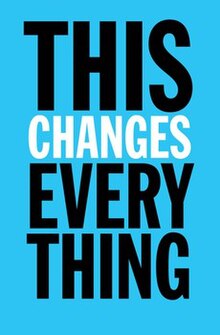This Changes Everything (book): Difference between revisions
No edit summary |
climate change (global warming) per Frank Luntz#Global warming type confusion |
||
| Line 20: | Line 20: | ||
In ''[[The New York Times Book Review]]'', Rob Nixon wrote that ''This Changes Everything'' was "the most momentous and contentious environmental book since ''[[Silent Spring]]''."<ref name="Rob Nixon"> Rob Nixon (November 6, 2014). [http://www.nytimes.com/2014/11/09/books/review/naomi-klein-this-changes-everything-review.html Naomi Klein’s ‘This Changes Everything’]. ''[[The New York Times]].'' Retrieved December 4, 2014.</ref> It was also included on their list of 100 notable books for 2014.<ref>[http://www.nytimes.com/2014/12/07/books/review/100-notable-books-of-2014.html 100 Notable Books of 2014]. ''[[The New York Times]],'' December 2, 2014. Retrieved December 7, 2014.</ref> |
In ''[[The New York Times Book Review]]'', Rob Nixon wrote that ''This Changes Everything'' was "the most momentous and contentious environmental book since ''[[Silent Spring]]''."<ref name="Rob Nixon"> Rob Nixon (November 6, 2014). [http://www.nytimes.com/2014/11/09/books/review/naomi-klein-this-changes-everything-review.html Naomi Klein’s ‘This Changes Everything’]. ''[[The New York Times]].'' Retrieved December 4, 2014.</ref> It was also included on their list of 100 notable books for 2014.<ref>[http://www.nytimes.com/2014/12/07/books/review/100-notable-books-of-2014.html 100 Notable Books of 2014]. ''[[The New York Times]],'' December 2, 2014. Retrieved December 7, 2014.</ref> |
||
In [[Monthly Review]], Professors [[John Bellamy Foster]] and [[Brett Clark (sociologist)|Brett Clark]] praised the book, writing that "Klein, who in ''[[No Logo]]'' ushered in a new generational critique of commodity culture, and who in ''[[The Shock Doctrine]]'' established herself as perhaps the most prominent North American critic of neoliberal disaster capitalism, signals that she has now, in [[William Morris]]’s famous metaphor, crossed “the river of fire” to become a critic of capital as a system. The reason is climate change, including the fact that we have waited too long to address it, and the reality that nothing short of an ecological revolution will now do the job." Foster and Clark also provided detailed counter-arguments in response to what they term are the "liberal critics" of the book.<ref>[http://monthlyreview.org/2015/02/01/crossing-the-river-of-fire/ Crossing the River of Fire - The Liberal Attack on Naomi Klein and This Changes Everything], published in ''[[Monthly Review]]'', 2015, Volume 66, Number 9 (February)</ref> |
In [[Monthly Review]], Professors [[John Bellamy Foster]] and [[Brett Clark (sociologist)|Brett Clark]] praised the book, writing that "Klein, who in ''[[No Logo]]'' ushered in a new generational critique of commodity culture, and who in ''[[The Shock Doctrine]]'' established herself as perhaps the most prominent North American critic of neoliberal disaster capitalism, signals that she has now, in [[William Morris]]’s famous metaphor, crossed “the river of fire” to become a critic of capital as a system. The reason is climate change ([[global warming]]), including the fact that we have waited too long to address it, and the reality that nothing short of an ecological revolution will now do the job." Foster and Clark also provided detailed counter-arguments in response to what they term are the "liberal critics" of the book.<ref>[http://monthlyreview.org/2015/02/01/crossing-the-river-of-fire/ Crossing the River of Fire - The Liberal Attack on Naomi Klein and This Changes Everything], published in ''[[Monthly Review]]'', 2015, Volume 66, Number 9 (February)</ref> |
||
==References== |
==References== |
||
Revision as of 08:15, 20 February 2015
 | |
| Author | Naomi Klein |
|---|---|
| Language | English |
| Subject | Climate change, economics |
| Genre | Non-fiction |
| Publisher | Simon & Schuster |
Publication date | 2014 |
| Media type | Hardcover |
| ISBN | 978-1451697384 |
This Changes Everything: Capitalism vs. the Climate is Naomi Klein's fourth book, and was published in September 2014.[1] In the book Klein argues that the climate crisis cannot be addressed in the current era of neoliberal market fundamentalism, which encourages profligate consumption and has resulted in mega mergers and trade agreements hostile to the health of the environment.[2]
The book won the 2014 Hilary Weston Writers' Trust Prize for Nonfiction,[3] and was a shortlisted nominee for the 2015 Shaughnessy Cohen Prize for Political Writing.[4]
In The New York Times Book Review, Rob Nixon wrote that This Changes Everything was "the most momentous and contentious environmental book since Silent Spring."[2] It was also included on their list of 100 notable books for 2014.[5]
In Monthly Review, Professors John Bellamy Foster and Brett Clark praised the book, writing that "Klein, who in No Logo ushered in a new generational critique of commodity culture, and who in The Shock Doctrine established herself as perhaps the most prominent North American critic of neoliberal disaster capitalism, signals that she has now, in William Morris’s famous metaphor, crossed “the river of fire” to become a critic of capital as a system. The reason is climate change (global warming), including the fact that we have waited too long to address it, and the reality that nothing short of an ecological revolution will now do the job." Foster and Clark also provided detailed counter-arguments in response to what they term are the "liberal critics" of the book.[6]
References
- ^ "This Changes Everything". This Changes Everything. Penguin Books. Retrieved September 11, 2014.
- ^ a b Rob Nixon (November 6, 2014). Naomi Klein’s ‘This Changes Everything’. The New York Times. Retrieved December 4, 2014.
- ^ "Naomi Klein wins 2014 Hilary Weston Prize". CBC Books, October 14, 2014.
- ^ "Shaughnessy Cohen Prize finalists announced". The Globe and Mail, January 27, 2015.
- ^ 100 Notable Books of 2014. The New York Times, December 2, 2014. Retrieved December 7, 2014.
- ^ Crossing the River of Fire - The Liberal Attack on Naomi Klein and This Changes Everything, published in Monthly Review, 2015, Volume 66, Number 9 (February)
External links
